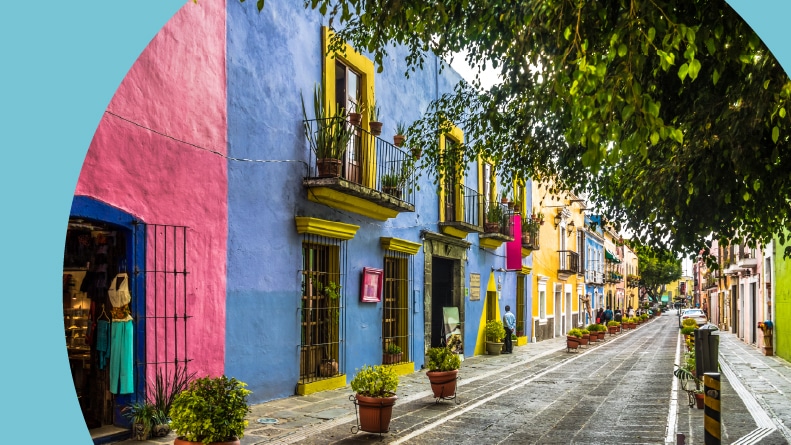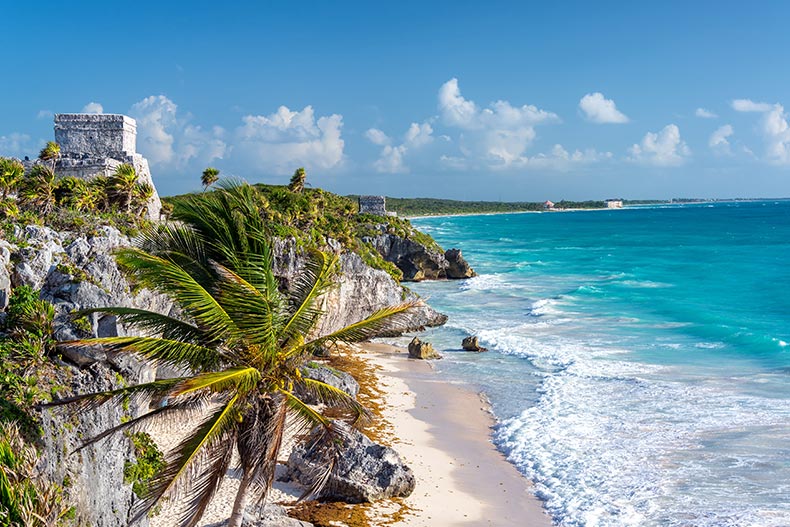If you’ve been exploring retirement options in the U.S. but haven’t found the perfect fit, you might wonder: Can I retire in Mexico? With its warm climate, rich culture, and lower cost of living, Mexico is an appealing choice for many retirees. However, an international move is a big step, and it’s important to understand the logistics, safety, and financial considerations.
Mexico’s year-round sunshine, vibrant communities, and world-class cuisine make it an attractive destination for active adults. While traveling across the border does require going through customs, there are ways to make the process easier. Programs like the Trusted Traveler Program and TSA PreCheck can help you save time and navigate border crossings more smoothly.
Before making the move, it’s essential to understand residency requirements, property ownership rules, and financial planning strategies. In this guide, we’ll answer your key questions and walk you through everything you need to know to retire in Mexico with confidence.
Is Mexico Safe for Retirees?

More than 1.6 million Americans live in Mexico, even if it might have an unsavory reputation based on media coverage and movie portrayals. And while certain parts of the country could be hazardous, most of the country is safe. Safety concerns are primarily in the northern border states, which have little appeal for travelers and expats. The U.S. Department of State frequently updates its website with areas it considers unsafe, though its advisories often err on the side of caution. Violent crime rarely targets foreigners.
Expat-friendly destinations across Mexico—such as Puerto Vallarta, La Paz, Lake Chapala and Ajijic, Puerto Escondido, San Miguel de Allende, Guanajuato, Santiago de Querétaro, Mérida, and the Riviera Maya—are among the country’s safest areas, often boasting lower crime rates than many U.S. cities. There are also nine U.S. consulates in Mexico and a U.S. Embassy in Mexico City.
Can I Afford to Retire in Mexico?

Florida and Arizona’s warm weather makes them retirement hotspots, but the cost of living in both states continues to rise. You’ll be surprised to see how much lower the cost of living is in Mexico, but this also depends on where you live. Being near a larger, established town will cost more since you’ll be closer to more amenities.
On average, the cost of a home, food, health insurance, utilities, and other necessities averages about $2,500 a month, according to InternationalLiving.com. This is approximately half of what it costs to live in the U.S. Also, to save money, you can live like a local and patronize street vendors and family-owned businesses.
Can I Buy Property in Mexico?

If you’re planning to buy property in Mexico, it’s smart to work with an English-speaking real estate agent and attorney if that’s your first language. Explore the different areas first, and try renting in one or two for about six months until you’re confident about the region. The general process of buying property in Mexico is similar to the U.S. unless the location is near the border or along the coasts.
Non-Mexican nationals looking to buy property in certain areas have to work with authorized banks and set up special trusts known as fideicomisos. With one of these, you’ll have complete ownership rights as a buyer but a bank will hold the legal title to your property as a trustee.
What Documents Do I Need to Live in Mexico?

Even if you’ve zeroed in on a property, you may still be wondering: “How can I retire in Mexico?” You’ll need to apply for a temporary or permanent resident visa at a Mexican consulate—there are many in the U.S. The application process isn’t too complicated. They will want to see a valid U.S. passport, a color photo, and proof of your economic solvency.
Temporary Residency in Mexico
For a temporary residency in Mexico, you must provide proof that you have savings and/or investments totaling at least $69,750. The total must not fall below this amount at any time over the last 12 months.
The first step in obtaining temporary residency in Mexico begins with an appointment at a Mexican consulate, where they will assess your eligibility. The non-refundable consular fee is $54.
Once approved, the second part of the process takes place in Mexico. There, you exchange your visa for a residency card. Most temporary residents receive a one-year residency card, which costs approximately $330. After the first year, you’ll need to renew your residency visa. The renewal can be extended for up to four years, with the following costs:
- 1 Year: ~$330 USD
- 2 Years: ~$495 USD
- 3 Years: ~$630 USD
Permanent Residency in Mexico
For a temporary residency in Mexico, you must provide proof that you have savings and/or investments totaling at least $279,000. Once again, the total must not fall below this amount at any time over the last 12 months.
If you qualify for permanent residency at the Mexican consulate, your visa is indefinite and does not require renewal. You’ll only pay a one-time fee of approximately $400.
What Do I Need to Know About Health Care in Mexico?

Mexico’s public health care system is accessible to all residents, including expatriates with temporary or permanent residency visas. According to AARP, the Instituto Mexicano del Seguro Social (IMSS) is Mexico’s public health insurance agency, and American retirees with legal residency qualify to sign up for this program. There are small premiums to pay, but private insurance coverage is also offered. The country also offers a free health care system from The Institute of Health for Well-being (INSABI). Mexican residents ages 60 and up can also apply for the INAPAM discount cards.
Many American retirees pay out-of-pocket for routine care in Mexico—a cost-saving strategy for many. Medicare doesn’t cover medical care in Mexico, but if you have a serious illness or injury, you have the option of traveling to the States for treatment.
How Do Taxes Work If I Retire in Mexico?

U.S. residents who retire and establish residency in Mexico still must file U.S. tax returns each year. That’s because federal taxation isn’t based on your place of residence; it’s based on your citizenship.
You’ll also be paying Mexican real estate taxes on your property, but this amount averages a few hundred dollars yearly. If you rent out your property in Mexico, you’ll need to file disclosure forms if you have $200,000 or more in foreign assets and/or $10,000 more in Mexican bank accounts. The law also requires that you report any rental income.
Can I Retire in Mexico?

Retiring in Mexico is an exciting possibility for those seeking a lower cost of living, warm weather, and a vibrant culture. With a range of residency options, affordable health care, and expat-friendly communities, Mexico offers a comfortable and enriching lifestyle for retirees. However, making the move requires careful planning—understanding residency requirements, property laws, health care options, and financial considerations.
If you’re serious about retiring in Mexico, take the time to visit different areas, consult with professionals, and ensure you meet the financial and legal requirements. Whether you’re drawn to a coastal paradise, a historic colonial city, or a tranquil lakeside town, Mexico offers plenty of options to suit your retirement dreams. With the right preparation, you can enjoy a fulfilling and affordable retirement in one of the world’s most welcoming destinations!



